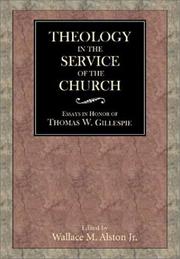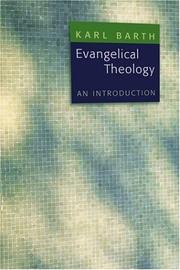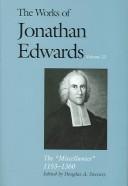| Listing 1 - 10 of 779 | << page >> |
Sort by
|
Book
Year: 2000 Publisher: Omaha Creighton University Press
Abstract | Keywords | Export | Availability | Bookmark
 Loading...
Loading...Choose an application
- Reference Manager
- EndNote
- RefWorks (Direct export to RefWorks)

ISBN: 0802838812 Year: 2000 Publisher: Grand Rapids (Mich.): Eerdmans
Abstract | Keywords | Export | Availability | Bookmark
 Loading...
Loading...Choose an application
- Reference Manager
- EndNote
- RefWorks (Direct export to RefWorks)
Book
ISBN: 9004474218 Year: 2000 Publisher: Leiden; Boston : BRILL,
Abstract | Keywords | Export | Availability | Bookmark
 Loading...
Loading...Choose an application
- Reference Manager
- EndNote
- RefWorks (Direct export to RefWorks)
Responding to Bishop Robert Ceneau, Sorbonnist, Bucer's subject-matter is twofold. Firstly, maintained is the compatibility of Reformation theology with Scripture, Patristic testimony, and the "saner Scholastics". Secondly, denying association with the heresy of Berengar, Bucer develops his perception of a common eucharistic theology among the Reformers, a theology Bucer finds corroborated in Scripture and Christian antiquity. After a plea for a fair hearing for the Reformation in France, Part I irenically surveys controverted dogmas and practices. Part II substantiates the thesis of fundamental harmony between Lutheran and Zwinglian eucharistic views. Part III rebuts Ceneau's polemical abuse. Republished as an Appendix is Bucer's contemporary memorandum on the viability of wider Church reunion. The tract reflects a significant transitional phase in Bucer's accommodation to both Catholic tradition and the Wittenberg sacramental theology.
Book
ISBN: 9021138301 Year: 2000 Publisher: Zoetermeer Meinema
Abstract | Keywords | Export | Availability | Bookmark
 Loading...
Loading...Choose an application
- Reference Manager
- EndNote
- RefWorks (Direct export to RefWorks)
Christian theology --- Theology --- Theology, Christian --- Christianity --- Religion
Book
ISBN: 9023239822 9023236319 9789023236313 Year: 2000 Volume: 6 Publisher: Assen Van Gorcum
Abstract | Keywords | Export | Availability | Bookmark
 Loading...
Loading...Choose an application
- Reference Manager
- EndNote
- RefWorks (Direct export to RefWorks)
Book
ISBN: 3429022657 9783429022655 Year: 2000 Publisher: Echter: Seelsorge,
Abstract | Keywords | Export | Availability | Bookmark
 Loading...
Loading...Choose an application
- Reference Manager
- EndNote
- RefWorks (Direct export to RefWorks)
Book
ISBN: 9783791717272 3791717278 Year: 2000 Publisher: Regensburg: Pustet,
Abstract | Keywords | Export | Availability | Bookmark
 Loading...
Loading...Choose an application
- Reference Manager
- EndNote
- RefWorks (Direct export to RefWorks)

ISBN: 9780802818195 0802818196 Year: 2000 Publisher: Grand Rapids: Eerdmans,
Abstract | Keywords | Export | Availability | Bookmark
 Loading...
Loading...Choose an application
- Reference Manager
- EndNote
- RefWorks (Direct export to RefWorks)

ISBN: 1842270028 9781842270028 Year: 2000 Publisher: Carlisle: Paternoster Press,
Abstract | Keywords | Export | Availability | Bookmark
 Loading...
Loading...Choose an application
- Reference Manager
- EndNote
- RefWorks (Direct export to RefWorks)

ISBN: 9780300083309 0300083300 Year: 2000 Publisher: New Haven: Yale university press,
Abstract | Keywords | Export | Availability | Bookmark
 Loading...
Loading...Choose an application
- Reference Manager
- EndNote
- RefWorks (Direct export to RefWorks)
Throughout his ministerial career, Jonathan Edwards filled a series of private notebooks with writings on a wide variety of theological topics, numbering his entries—some 1,400 of them—in sequence. This book, the second of four volumes devoted to these “Miscellanies,” contains entries written during the decade of the 1730s, from July 1731 to approximately January 1740, the eve of the Great Awakening. They record the development of Edwards’ thought as he first emerged as a public spokesperson for orthodox Calvinism, assumed a leadership role in colonial New England church politics, and acquired an international reputation as an evangelist for his role in the revivals in the Connecticut River Valley of 1734 and 1735.Edwards used the “Miscellanies” as a repository for ideas that he intended to develop in future sermons and treatises, and these entries contain the seeds of such contemporaneous works as Justification by Faith Alone and The History of the Work of Redemption. These entries also record how the Connecticut Valley revivals influenced Edwards’ thoughts on such important theological topics as the significance of perseverance, the nature of spiritual knowledge, justification by faith alone, the rationality of the Christian religion, the history of the work of redemption, and conversion and the religious life.
| Listing 1 - 10 of 779 | << page >> |
Sort by
|

 Search
Search Feedback
Feedback About UniCat
About UniCat  Help
Help News
News